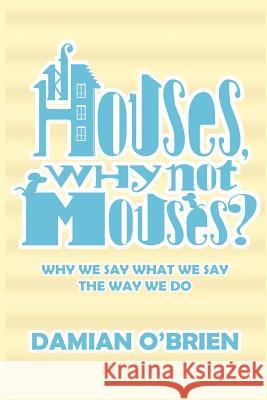If Houses, Why Not Mouses? » książka
If Houses, Why Not Mouses?
ISBN-13: 9781909395596 / Angielski / Miękka / 2012 / 140 str.
This isn't just another history of English or a catalogue of etymologies. It explores some of the most obvious but unusual features of English, which are also some of the least understood by many of its speakers. These include: If she works, why not she cans or she mights? Why do patterns like drive, drove, driven exist? Where did the l in could come from? Why don't we pronounce ght in words like eight and bought? How can be, is, and was all be parts of one verb? If goose, why gander? If see, why saw? Why does one sound like it starts with w? Drawing on sources as diverse as Sanskrit grammatical treatises, the Bible in six ancient languages, an Anglo-Saxon monk's survey of whelk-farming, Middle English allegory, Winston Churchill's memoirs, and the lyrics of reggae legend Lee Scratch Perry, If Houses, Why Not Mouses? is for anyone interested in language, and serves as an introduction to historical linguistics."
This isnt just another history of English or a catalogue of etymologies. It explores some of the most obvious but unusual features of English, which are also some of the least understood by many of its speakers. These include:• If she works, why not she cans or she mights?• Why do patterns like drive, drove, driven exist?• Where did the l in could come from?• Why dont we pronounce ght in words like eight andbought?• How can be, is, and was all be parts of one verb?• If goose, why gander?• If see, why saw?• Why does one sound like it starts with w?Drawing on sources as diverse as Sanskrit grammatical treatises, the Bible in six ancient languages, an Anglo-Saxon monks survey of whelk-farming, Middle English allegory, Winston Churchills memoirs, and the lyrics of reggae legend Lee Scratch Perry, If Houses, Why Not Mouses? is for anyone interested in language, and serves as an introduction to historical linguistics.











